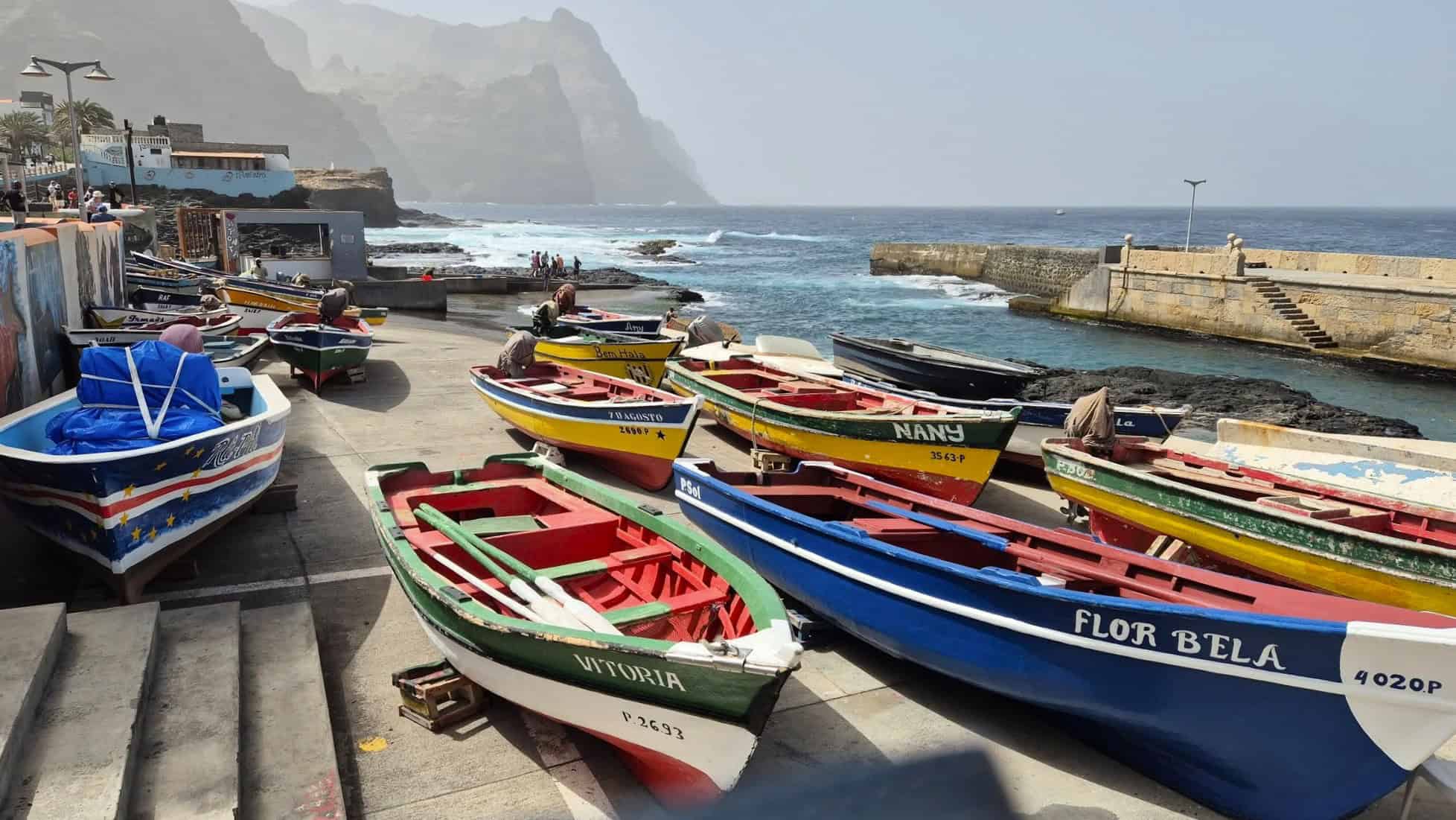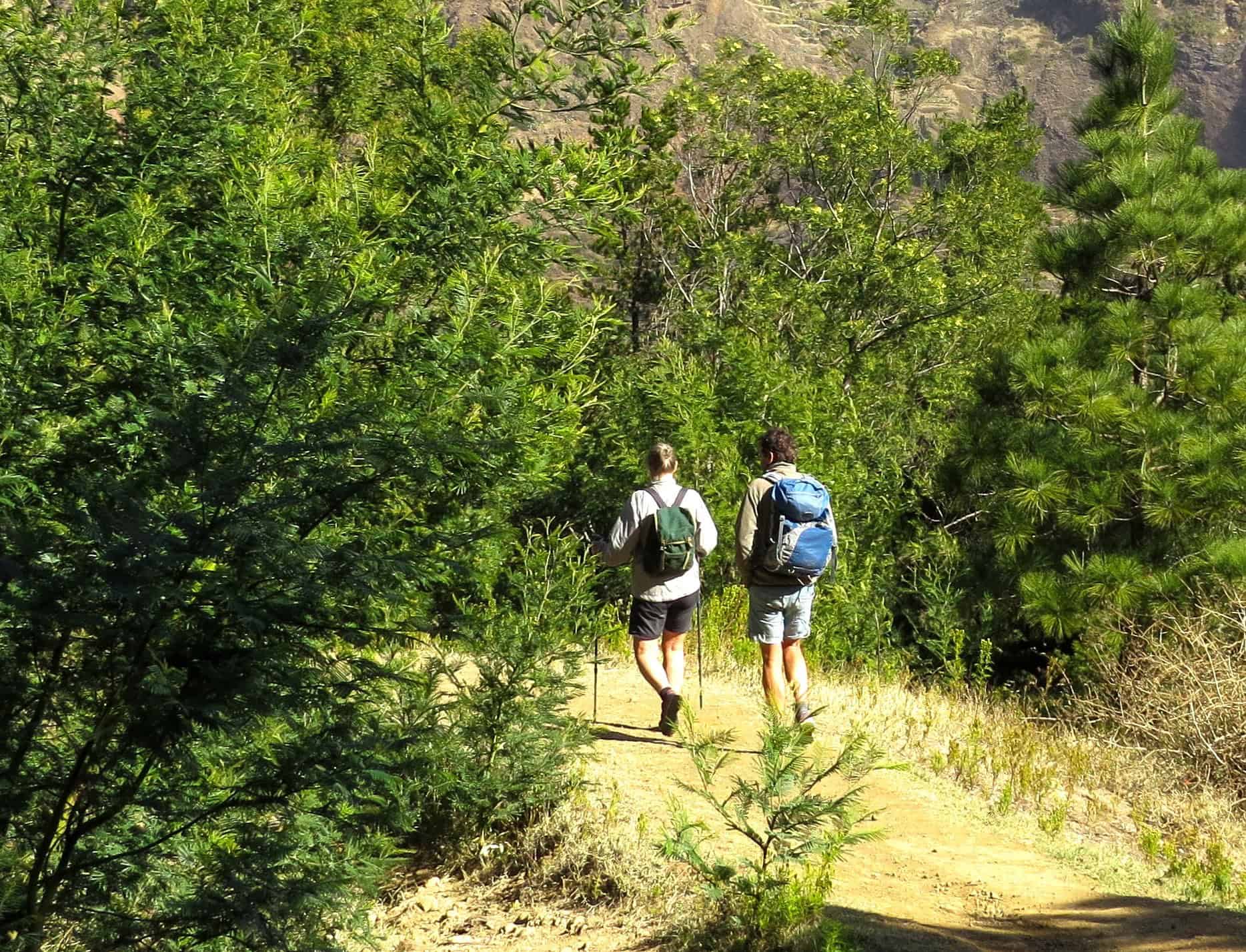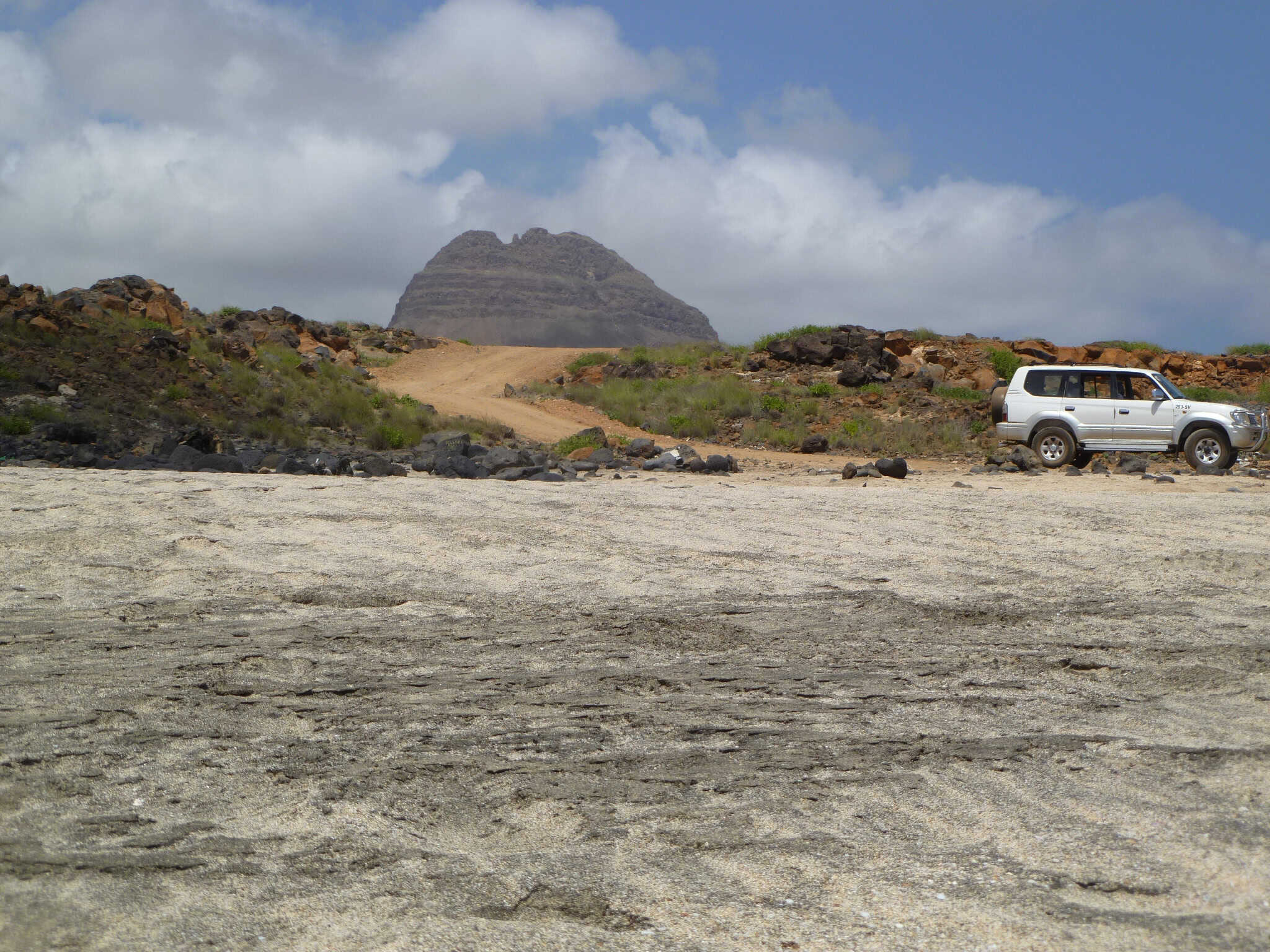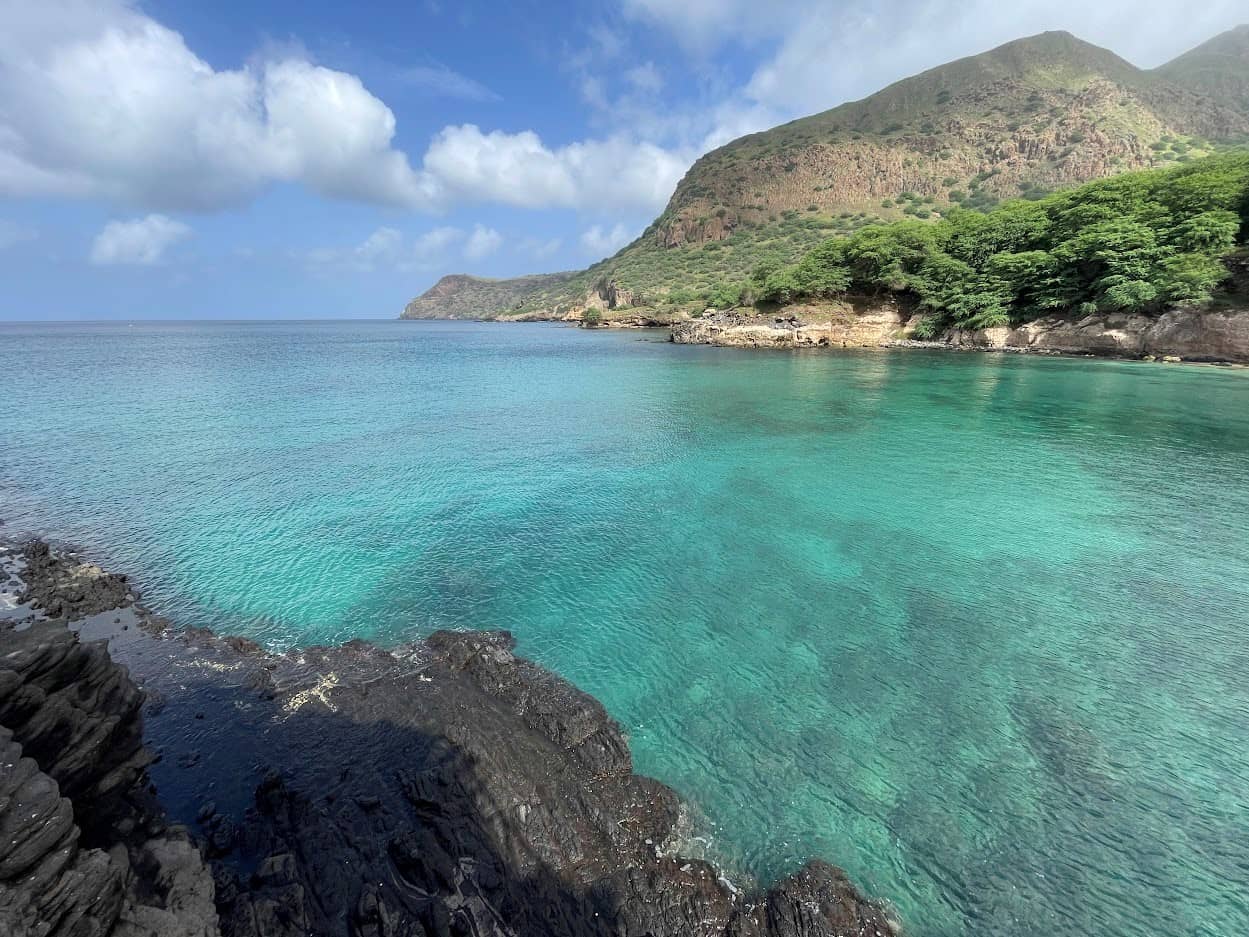Cape Verde
Explore the nine volcanic islands of Cape Verde in our range of fully customisable holiday itineraries
You are here: Home > Cape Verde
An African Island Country with nine wonderfully diverse islands
Cape Verde was first colonised by the Portuguese in the fifteen hundreds during the ‘age of discovery’. The first settlement, established on Santiago, was the first European colony in sub-saharan Africa. Cape Verde was at the centre of maritime trade during this period, when the Portuguese empire was at its height.

In 1975 Cape Verde was granted independence and became an African island country. It remains Portuguese speaking, though a creole varient that has strong west African notes. The Cape Verdeans are wonderfully relaxed and welcoming. Music is very much a part of their culture, in the same way that the fishing communities are at the heart of village life.
From sand dunes to secluded beaches and remote mountain valleys
Look beyond the resorts on Sal and you will find a dramatically beautiful landscape. These African islands are cultural vibrant and wonderfully varied. Enjoy sand dunes, idyllic sandy beaches, rugged coastlines, and remote mountain villages.
Cape Verde has a year-round warm climate and is particularly popular as a winter-sun destination. Explore our range of holiday itineraries, all fully customisable, with accommodation and activities that are hand-picked for you.
Self Guided and Guided Walking Holidays

The walking trails on Cape Verde are incredible, and particularly so because they are not well known. You can enjoy full-day treks through steep valleys, passing quaint mountain villages and rural pastures along the way. Or perhaps you enjoy easy walks. There are plenty we can recommend, some of which can be done independently.

Two of the most popular walks on Cape Verde are on Santo Antao. Perhaps the most well known is the Paul Valley walk, which starts with at the rim of a volcanic crater, the Cova do Paul. Another popular walk is the coastal trail that leads you to pretty Ponta do Sol. For those looking for a physical challenge with geographical intrigue, why not summit Fogo Volcano on Fogo Island. We can make personal recommendations for walks across all nine islands of Cape Verde.
Jeep Tours and Site Seeing Excursions

There is so much to see and do in Cape Verde, and each of the nine islands is very different in flavour. Many who visit Cape Verde don’t explore beyond the beaches and resorts of Sal, but to get a real flavour of Cape Verde we recommend an island hopping holiday. There are the culturally rich islands of Sao Vicente and Santiago, the secluded beach at Tarrafal on Santiago, walking in the Paul Valley on Santo Antao, and exploring the old Portuguese outpost at Cidade Velha on Santiago.
Secluded Beaches and sheltered bays

Many people will flock to the island of Sal in Cape Verde to enjoy the expansive white sand beaches. This is a particularly good choice if you enjoy watersports, because there are a whole host of activities on offer, from surfing, to sailing in a catamaran. But we prefer the more secluded beaches, away from the crowds. Perhaps our favourite location is Tarrafal on Santiago, where you can enjoy turquoise waters in the sheltered bay.
If you want to know more about Cape, do give us a call. We can recommend which islands are best for Portuguese colonial history, for culture and music, for walking, and for site seeing.
Learn more about Cape Verde at our dedicated Cape Verde Website
Guided walking
Walking is a great way to explore the islands, especially accompanied with one of our expert local guides. They'll provide delicious picnics and tell you all about the flora, fauna and culture of Cape Verde. Walks vary from 2-6 hours some along cobbled paths linking villages, others follow the rugged coast and the most challenging route climbs Fogo volcano - topping out at 2,829m. Our guided walks are always in small groups and are often private - so you can chat with your guide and vary the day according to your needs.
Private guided day tours
Our private guided day tours take you through Cape Verde's spectacular scenery to forests, deserts, waterfalls, deep valleys and volcanic craters all in the company of an English speaking guide.
Take a tour of São Vicente through the empty beaches of Calhau, the Saharan sand dunes, the music festival capital at Baia das Gatas and the island's highest peak, Monteverde.
If you visiting Santo Antão, then it's great fun riding in the the back of a pick up truck visiting Tarrafal along it's rocky roads.
Diving
Here in Cape Verde, the diving's good all year round. It's warm waters are rich in marine life, making Cape Verde perfect for your diving holiday. Dives can be arranged from most of the islands and courses are also offered - refresher, discover, open water and advanced. We'd suggest heading for Sao Vicente, Santiago or Sal for your Cape Verde diving holiday.
Turtle watching
With the third largest population of nesting loggerhead turtles, Cape Verde is perfect for turtle watching holidays. Most nest on the islands of Boavista and Sal between the months of July and October, and August is the main month for observations.
On both Boavista and Sal there are several small turtle conservation projects. You can pay a donation to visit their hatcheries and take a night patrol on the beach with a ranger.
Windsurfing
Cape Verde is windsurf heaven, regularly hosting world class competitions including the world championships. With beaches with water only 1-2m deep, no currents and great swell, it's an ideal spot for windsurfers of all abilities.
Horse riding
Our guided rides on Sal follow white sand beaches, through aquamarine water and cross salt pans giving yet another perspective on the island. All rides vary in length and difficulty depending on ability and helmets are provided.
How do I go about booking my holiday to Cape Verde with Archipelago Choice?
We offer two options, either book one of our ‘Best of’ holidays from the website. Alternatively, many people choose the bespoke approach where we have an insightful conversation and create a personalised itinerary that gives you the unique holiday experience you’re looking for.
How far in advance should I book my trip to Cape Verde?
Our advice is to start planning around nine months prior your visit, as this helps us offer the best value airfares and secure your hotels of choice.
Can I book a last-minute holiday to Cape Verde?
Absolutely; although when booking last-minute of course it helps if you have a bit of flexibility with accommodation so we can find you suitable space. Flights tend to be more expensive last-minute too.
Where is Cape Verde?
The Cape Verde archipelago is a group of 10 islands located 570km off the Senegal coast of west Africa.
When is the best time to visit Cape Verde?
Weather is good at anytime of year and always warm. The main differences are the windy period (October to June) and the rainy season (August to September). Most people tend to go November to April.
How do I get to Cape Verde?
There are several direct flights from the UK a week to Cape Verde taking just under 6 hours as well direct flights from Lisbon, Amsterdam and Boston.
Do I need a visa to visit Cape Verde?
Tourist visas are no longer required for UK and EU citizens. Check your passport is valid for at least 6 months after your planned return date. If you are travelling with us we will arrange your airport security tax pre-payment. You will just need to fill out an international travel form to enter or travel through Cape Verde. It is recommended that you take a copy of your travel insurance policy for consultation in case of an emergency.
What languages are spoken on Cape Verde?
English is spoken by our guides and most hoteliers but it would be worth having a few Portuguese or French phrases to hand, especially in cafes and restaurants. Portuguese is the official language of Cape Verde but everyone speaks ‘Criolu’ (creole) – a mix of Portuguese and particular African words and dialects. French is commonly understood too.
Is it safe to drive on Cape Verde?
Most people prefer not to drive – though in our view, Santiago and Santo Antao offer interesting options for self driving if you’d like a road touring adventure. Most other islands are too small to warrant exploration by car.
Do I need an international driver’s license for Cape Verde?
All you require is a valid UK driving licence.
Do I need travel insurance to visit Cape Verde?
We highly recommend that you have the right type of travel insurance that will cover your medical expenses, baggage loss, accidents and personal liability and repatriation.
Can I get WiFi on Cape Verde?
In the larger hotels, WiFi is available but not in the smaller hotels.
Can I use my mobile phone on Cape Verde?
There’s good mobile reception right across the islands though it can be expensive as you are outside of Europe. However you’ll need a local SIM card.
If you’re on a dual-SIM mobile that accepts e-SIMs then you might consider an app like airalo that makes it easy to buy a Cape Verde e-SIM.
What is the food like on Cape Verde?
Traditional Cape Verdean dishes consist of fish and chicken with rice, beans and vegetables including cabbage, carrots, potatoes, sweet potatoes, tomatoes, pumpkin etc. If you have any food allergies, just let us know. Beer, wine and local spirits are widely available including the locally produced ‘grogue’, a sugar cane liquor often drunk with honey (Ponche). Red and white wines are also produced on the islands.
Are credit & debit cards accepted in Cape Verde?
Most large hotels accept credit cards but for all small transactions elsewhere you’ll need to pay in cash. In most towns and airports there are ATMs where you can draw CVE cash.
What type of plug adapter do I need in Cape Verde?
You will need a type F and type C adaptor.
Is tap water safe to drink in Cape Verde?
No, you should drink bottled water – consider taking a water filter bottle to fill from the tap to save on using lots of plastic bottles.
Do I need to tip in Cape Verde?
Tipping is not compulsory but if you feel your guide or driver has done a good job then they’ll always be happy to receive a tip.
In our experience these are the best times of the year to visit Cape Verde:
Jan
Feb
Mar
Apr
May
Jun
Jul
Aug
Sep
Oct
Nov
Dec
An African Island Country with nine wonderfully diverse islands
Cape Verde was first colonised by the Portuguese in the fifteen hundreds during the ‘age of discovery’. The first settlement, established on Santiago, was the first European colony in sub-saharan Africa. Cape Verde was at the centre of maritime trade during this period, when the Portuguese empire was at its height.

In 1975 Cape Verde was granted independence and became an African island country. It remains Portuguese speaking, though a creole varient that has strong west African notes. The Cape Verdeans are wonderfully relaxed and welcoming. Music is very much a part of their culture, in the same way that the fishing communities are at the heart of village life.
From sand dunes to secluded beaches and remote mountain valleys
Look beyond the resorts on Sal and you will find a dramatically beautiful landscape. These African islands are cultural vibrant and wonderfully varied. Enjoy sand dunes, idyllic sandy beaches, rugged coastlines, and remote mountain villages.
Cape Verde has a year-round warm climate and is particularly popular as a winter-sun destination. Explore our range of holiday itineraries, all fully customisable, with accommodation and activities that are hand-picked for you.
Self Guided and Guided Walking Holidays

The walking trails on Cape Verde are incredible, and particularly so because they are not well known. You can enjoy full-day treks through steep valleys, passing quaint mountain villages and rural pastures along the way. Or perhaps you enjoy easy walks. There are plenty we can recommend, some of which can be done independently.

Two of the most popular walks on Cape Verde are on Santo Antao. Perhaps the most well known is the Paul Valley walk, which starts with at the rim of a volcanic crater, the Cova do Paul. Another popular walk is the coastal trail that leads you to pretty Ponta do Sol. For those looking for a physical challenge with geographical intrigue, why not summit Fogo Volcano on Fogo Island. We can make personal recommendations for walks across all nine islands of Cape Verde.
Jeep Tours and Site Seeing Excursions

There is so much to see and do in Cape Verde, and each of the nine islands is very different in flavour. Many who visit Cape Verde don’t explore beyond the beaches and resorts of Sal, but to get a real flavour of Cape Verde we recommend an island hopping holiday. There are the culturally rich islands of Sao Vicente and Santiago, the secluded beach at Tarrafal on Santiago, walking in the Paul Valley on Santo Antao, and exploring the old Portuguese outpost at Cidade Velha on Santiago.
Secluded Beaches and sheltered bays

Many people will flock to the island of Sal in Cape Verde to enjoy the expansive white sand beaches. This is a particularly good choice if you enjoy watersports, because there are a whole host of activities on offer, from surfing, to sailing in a catamaran. But we prefer the more secluded beaches, away from the crowds. Perhaps our favourite location is Tarrafal on Santiago, where you can enjoy turquoise waters in the sheltered bay.
If you want to know more about Cape, do give us a call. We can recommend which islands are best for Portuguese colonial history, for culture and music, for walking, and for site seeing.
Learn more about Cape Verde at our dedicated Cape Verde Website
Guided walking
Walking is a great way to explore the islands, especially accompanied with one of our expert local guides. They'll provide delicious picnics and tell you all about the flora, fauna and culture of Cape Verde. Walks vary from 2-6 hours some along cobbled paths linking villages, others follow the rugged coast and the most challenging route climbs Fogo volcano - topping out at 2,829m. Our guided walks are always in small groups and are often private - so you can chat with your guide and vary the day according to your needs.
Private guided day tours
Our private guided day tours take you through Cape Verde's spectacular scenery to forests, deserts, waterfalls, deep valleys and volcanic craters all in the company of an English speaking guide.
Take a tour of São Vicente through the empty beaches of Calhau, the Saharan sand dunes, the music festival capital at Baia das Gatas and the island's highest peak, Monteverde.
If you visiting Santo Antão, then it's great fun riding in the the back of a pick up truck visiting Tarrafal along it's rocky roads.
Diving
Here in Cape Verde, the diving's good all year round. It's warm waters are rich in marine life, making Cape Verde perfect for your diving holiday. Dives can be arranged from most of the islands and courses are also offered - refresher, discover, open water and advanced. We'd suggest heading for Sao Vicente, Santiago or Sal for your Cape Verde diving holiday.
Turtle watching
With the third largest population of nesting loggerhead turtles, Cape Verde is perfect for turtle watching holidays. Most nest on the islands of Boavista and Sal between the months of July and October, and August is the main month for observations.
On both Boavista and Sal there are several small turtle conservation projects. You can pay a donation to visit their hatcheries and take a night patrol on the beach with a ranger.
Windsurfing
Cape Verde is windsurf heaven, regularly hosting world class competitions including the world championships. With beaches with water only 1-2m deep, no currents and great swell, it's an ideal spot for windsurfers of all abilities.
Horse riding
Our guided rides on Sal follow white sand beaches, through aquamarine water and cross salt pans giving yet another perspective on the island. All rides vary in length and difficulty depending on ability and helmets are provided.
How do I go about booking my holiday to Cape Verde with Archipelago Choice?
We offer two options, either book one of our ‘Best of’ holidays from the website. Alternatively, many people choose the bespoke approach where we have an insightful conversation and create a personalised itinerary that gives you the unique holiday experience you’re looking for.
How far in advance should I book my trip to Cape Verde?
Our advice is to start planning around nine months prior your visit, as this helps us offer the best value airfares and secure your hotels of choice.
Can I book a last-minute holiday to Cape Verde?
Absolutely; although when booking last-minute of course it helps if you have a bit of flexibility with accommodation so we can find you suitable space. Flights tend to be more expensive last-minute too.
Where is Cape Verde?
The Cape Verde archipelago is a group of 10 islands located 570km off the Senegal coast of west Africa.
When is the best time to visit Cape Verde?
Weather is good at anytime of year and always warm. The main differences are the windy period (October to June) and the rainy season (August to September). Most people tend to go November to April.
How do I get to Cape Verde?
There are several direct flights from the UK a week to Cape Verde taking just under 6 hours as well direct flights from Lisbon, Amsterdam and Boston.
Do I need a visa to visit Cape Verde?
Tourist visas are no longer required for UK and EU citizens. Check your passport is valid for at least 6 months after your planned return date. If you are travelling with us we will arrange your airport security tax pre-payment. You will just need to fill out an international travel form to enter or travel through Cape Verde. It is recommended that you take a copy of your travel insurance policy for consultation in case of an emergency.
What languages are spoken on Cape Verde?
English is spoken by our guides and most hoteliers but it would be worth having a few Portuguese or French phrases to hand, especially in cafes and restaurants. Portuguese is the official language of Cape Verde but everyone speaks ‘Criolu’ (creole) – a mix of Portuguese and particular African words and dialects. French is commonly understood too.
Is it safe to drive on Cape Verde?
Most people prefer not to drive – though in our view, Santiago and Santo Antao offer interesting options for self driving if you’d like a road touring adventure. Most other islands are too small to warrant exploration by car.
Do I need an international driver’s license for Cape Verde?
All you require is a valid UK driving licence.
Do I need travel insurance to visit Cape Verde?
We highly recommend that you have the right type of travel insurance that will cover your medical expenses, baggage loss, accidents and personal liability and repatriation.
Can I get WiFi on Cape Verde?
In the larger hotels, WiFi is available but not in the smaller hotels.
Can I use my mobile phone on Cape Verde?
There’s good mobile reception right across the islands though it can be expensive as you are outside of Europe. However you’ll need a local SIM card.
If you’re on a dual-SIM mobile that accepts e-SIMs then you might consider an app like airalo that makes it easy to buy a Cape Verde e-SIM.
What is the food like on Cape Verde?
Traditional Cape Verdean dishes consist of fish and chicken with rice, beans and vegetables including cabbage, carrots, potatoes, sweet potatoes, tomatoes, pumpkin etc. If you have any food allergies, just let us know. Beer, wine and local spirits are widely available including the locally produced ‘grogue’, a sugar cane liquor often drunk with honey (Ponche). Red and white wines are also produced on the islands.
Are credit & debit cards accepted in Cape Verde?
Most large hotels accept credit cards but for all small transactions elsewhere you’ll need to pay in cash. In most towns and airports there are ATMs where you can draw CVE cash.
What type of plug adapter do I need in Cape Verde?
You will need a type F and type C adaptor.
Is tap water safe to drink in Cape Verde?
No, you should drink bottled water – consider taking a water filter bottle to fill from the tap to save on using lots of plastic bottles.
Do I need to tip in Cape Verde?
Tipping is not compulsory but if you feel your guide or driver has done a good job then they’ll always be happy to receive a tip.
In our experience these are the best times of the year to visit Cape Verde:
Jan
Feb
Mar
Apr
May
Jun
Jul
Aug
Sep
Oct
Nov
Dec

